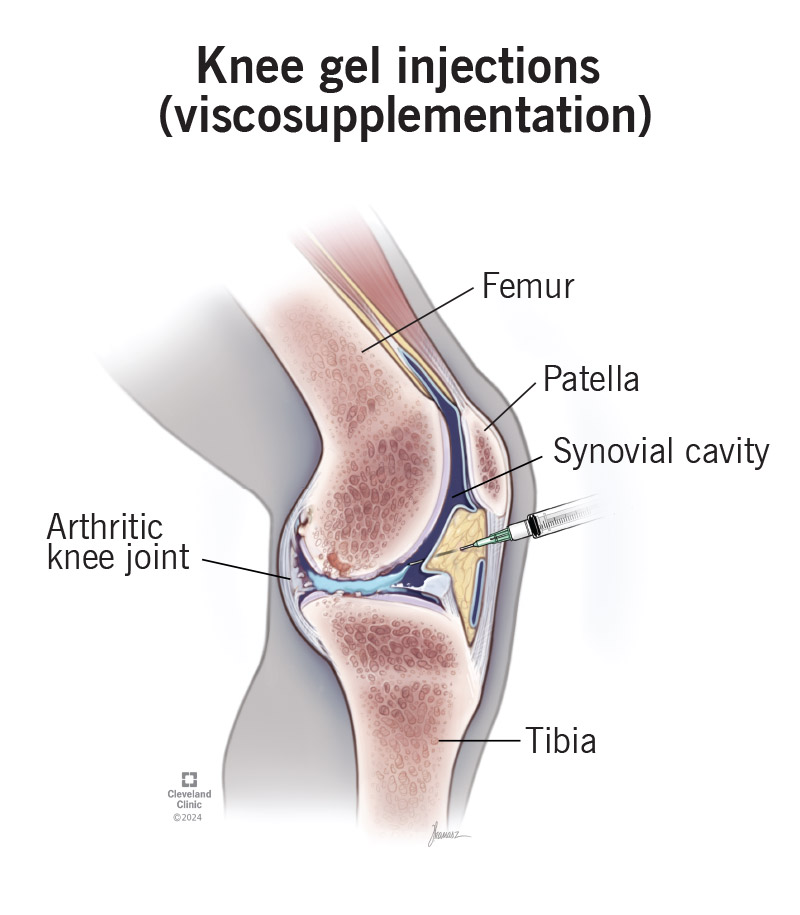How Much Do Knee Gel Injections Really Cost? A 2025 Guide

Key points
- Per Injection: A single hyaluronic acid injection typically costs between $500 and $1,300 when paying out-of-pocket.
- Full Treatment Series: Most treatment protocols involve a series of 3 to 5 weekly injections. The total cost for a complete series can range from $1,200 to over $3,000.
Knee gel injections, clinically known as viscosupplementation, are a common treatment for the pain and stiffness caused by knee osteoarthritis. By injecting a gel-like substance called hyaluronic acid (HA) into the knee, this procedure aims to restore the natural lubrication and cushioning of the joint.
However, navigating the cost of this treatment can be complex. The price you are quoted is often just the starting point. This comprehensive guide breaks down the real cost of knee gel injections, uncovering the various factors that influence the final bill, from insurance coverage and hidden fees to the ongoing debate about their true value.
What is the Average Cost of Knee Gel Injections?
The out-of-pocket cost for knee gel injections varies widely. Based on data from multiple healthcare providers and cost analyses, you can expect the following price ranges:
- Per Injection: A single hyaluronic acid injection typically costs between $500 and $1,300 when paying out-of-pocket.
- Full Treatment Series: Most treatment protocols involve a series of 3 to 5 weekly injections. The total cost for a complete series can range from $1,200 to over $3,000.
A 2022 study on nonsurgical treatments for knee osteoarthritis, cited by Medical News Today, found the average cost per session to be approximately $1,019.
Factors That Influence the Final Price: The 'All-In' Cost
The sticker price of the injection itself is only one piece of the puzzle. Several other factors contribute to your final bill, often referred to as the "all-in" cost.
Provider and Facility Fees
The same procedure can have a different price tag depending on where it's performed. A specialized orthopedic clinic may have different rates than a hospital's outpatient department, which often includes separate facility fees.
Geographic Location
Healthcare costs can differ significantly based on your location. Urban centers with a higher cost of living generally have higher prices for medical procedures compared to rural areas.
Brand of the Injection
Several brands of hyaluronic acid injections are available, and their costs and treatment protocols differ. Common brands include:
- Synvisc-One® (often a single-injection formula)
- Hyalgan®
- Orthovisc®
- Monovisc®
- Supartz FX™
The specific brand your doctor recommends can impact the total number of required visits and the overall price.
Use of Ultrasound Guidance
To ensure the injection is placed accurately within the joint capsule, some doctors use ultrasound guidance. While this can improve the effectiveness of the shot, it typically adds a separate fee to the procedure cost.
Additional Medical Services
The total cost should also account for related services, such as the initial consultation fee, follow-up appointments, and any recommended physical therapy to complement the treatment.
Does Insurance Cover Knee Gel Injections?
Insurance coverage is the most significant factor determining your out-of-pocket expense. Most plans, including Medicare, cover the procedure, but only if specific criteria are met.
Medicare Coverage Explained
Medicare Part B typically covers 80% of the Medicare-approved amount for knee gel injections once you have met your annual deductible. This leaves you responsible for the remaining 20% coinsurance.
However, Medicare enforces strict requirements for coverage, which are detailed by the Centers for Medicare & Medicaid Services (CMS). You must:
- Have a confirmed diagnosis of symptomatic knee osteoarthritis.
- Provide medical imaging (like an X-ray) that confirms the diagnosis.
- Have tried and failed at least three months of conservative treatments (e.g., physical therapy, exercise, pain relievers like NSAIDs).
- Have unsuccessfully tried corticosteroid injections or be unable to receive them due to another medical condition.
Medicare also stipulates that a repeat series of injections will only be covered if at least six months have passed since the previous treatment.
Private Insurance Coverage
Coverage from private insurance companies varies widely by plan. Most insurers follow similar medical necessity guidelines as Medicare. Before starting treatment, it is crucial to:
- Contact your insurer: Confirm the specifics of your coverage for viscosupplementation.
- Ask about prior authorization: Many plans require your doctor to get approval before administering the injections.
- Understand your costs: Clarify your deductible, copayment, and coinsurance responsibilities.
The Cost-Effectiveness Debate: Are Gel Injections Worth It?
While many patients report substantial pain relief from gel injections, the medical community is divided on their effectiveness, leading to a debate about their value.
Clinical Evidence vs. Patient Experience
Many patients find that gel injections provide enough relief to improve their quality of life and delay the need for a knee replacement surgery. They experience reduced pain, less stiffness, and better mobility for daily activities.
However, the clinical evidence is less convincing. A large-scale 2022 review of 50 years of data published in The BMJ concluded that hyaluronic acid injections offer a "clinically irrelevant" benefit over placebo injections. This has led major medical bodies, including the American Academy of Orthopaedic Surgeons (AAOS) and the American College of Rheumatology (ACR), to issue conditional recommendations against their use for knee osteoarthritis.
Cost Comparison: HA vs. Other Treatments
When considering value, it's helpful to compare gel injections to alternatives.
- Corticosteroids: These anti-inflammatory injections are less expensive than HA and often recommended for short-term relief of acute flare-ups.
- No Injections: A 2022 study found that patients who received either HA or corticosteroid injections had higher long-term healthcare costs and a greater likelihood of eventually needing a total knee replacement compared to those who received no injections. The pathway involving HA injections was the most expensive.
Single-Dose vs. Multi-Dose Series: A Cost Comparison
Traditionally, viscosupplementation was administered as a series of three to five injections, spaced one week apart. Today, single-injection formulations are available, which offer a full course of treatment in one visit.
A growing body of research suggests that single-injection treatments are more cost-effective. A 2017 study found that a single-injection option was cheaper and led to better outcomes at 24 weeks than a five-injection series. Beyond the direct medical savings, a single visit reduces indirect costs for patients, such as transportation, parking, and time away from work. While some conflicting data exists, efficacy is generally considered comparable between the two methods, making the single-injection regimen an attractive and convenient alternative.
Who Should Not Get Knee Gel Injections?
According to the Mayo Clinic, viscosupplementation is not recommended for everyone. You should avoid this treatment if you have:
- An allergy to hyaluronic acid products or to gram-positive bacterial proteins (some HA is derived from rooster combs).
- An active infection in or around the knee joint.
- A skin disease or infection at the injection site.
Discuss your full medical history with your doctor to ensure this treatment is safe for you.
References
- Arthritis Knee Pain Centers. (n.d.). Knee Gel Injections Cost. Retrieved from https://arthritiskneepain.com/knee-gel-injections-cost/
- Bahou, C. (2024). Medicare and rooster comb injections: What to know. Medical News Today. Retrieved from https://www.medicalnewstoday.com/articles/does-medicare-pay-for-rooster-comb-injections
- Cleveland Clinic. (n.d.). Knee Gel Injections (Viscosupplementation). Retrieved from https://my.clevelandclinic.org/health/procedures/knee-gel-injections-viscosupplementation
- Cueto, I. (2022). Common injections don’t help knee osteoarthritis more than placebo, large data review finds. STAT News. Retrieved from https://www.statnews.com/2022/07/06/hyaluronic-acid-injections-dont-help-knee-osteoarthritis-review-finds/
- Hobbs, H. (2024). Knee Gel Injections and Medicare: Coverage Details. Healthline. Retrieved from https://www.healthline.com/health/medicare/does-medicare-pay-for-rooster-comb-injections
- Mayo Clinic. (2025). Hyaluronic Acid (Injection Route). Retrieved from https://www.mayoclinic.org/drugs-supplements/hyaluronic-acid-injection-route/description/drg-20074557
- Rath, L. (2024). Hyaluronic Acid Injections. Arthritis Foundation. Retrieved from https://www.arthritis.org/health-wellness/treatment/treatment-plan/disease-management/hyaluronic-acid-injections-for-knee-pain

About the author
Samuel Jones, MD, is a board-certified orthopedic surgeon specializing in joint replacement and orthopedic trauma. He is a team physician for a professional sports team and practices at a renowned orthopedic institute in Georgia.
